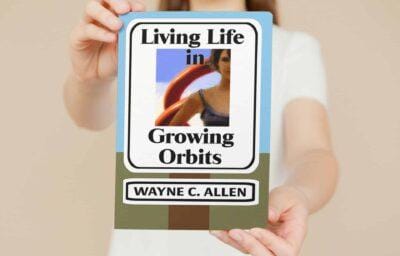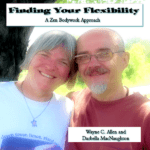- Bring Wisdom — 12 Ideas
- About Anxiety — 12 Ideas
- About Taking Action — 12 Ideas
- About Self Actualizing — 12 Ideas
- About Results — 12 Ideas
- About Mind Movies — 12 Ideas
- About Knowing Yourself — 12 Ideas
- About Being Chained – 12 Ideas Series
- About I‑am-ness — 12 Ideas
- About Happiness – 12 Ideas
- About No Past – 12 Ideas
- About Embodiment — 12 Ideas
Embodiment — you are all of you — body, mind, and energy. There are ways to empower yourself, to free yourself, to experience “non-holding.”

Living Life in Growing Orbits is our workbook.
52 weeks of daily exercises designed to help you figure yourself out.
Check out Living Life in Growing Orbits on our site.
Direct link to Amazon
Purchase digital versions (Apple, Nook, Kobo, etc.) from this page
Our approach is quite holistic. My principal goal in life is to be fully engaged with all of me. This is because the only reality you can ever understand — or get your hands on — is your own.
Finding Focus
A description of “Zen being”

The essence of Zen is zazen, the act of simply sitting.
Many people want to make a “thing” out of sitting. They do this to accomplish something else — for example, to get relaxed, to recover from an illness, to be “spiritual.”
I remember hearing a woman attempt this process of judgement as opposed to “just sitting” at a Zen Centre Darbella and I attended.
“I have meditated for years, with many, many teachers, and I have never found what I am searching for.“
When asked what the missing ingredient was, she said, “Peace of mind, and mystical visions.”
I would say, “The point of sitting is to sit.”
- The point of breathing is to breathe.
- The point of bodywork is to feel “what’s up” in the body — to experience directly the tightness, the soreness, the blockages, and the armouring.
- The point of freeing blocked energy is to feel your energy.
- The point of freeing your thoughts is to experience the thought process without attaching to it.
And… the point of living is to live.
Most people I know are engaged in a desperate search for the meaning of life — for the reasons behind pain, or tension, or armouring. Most people do not fully engage with anything — they think whatever they are doing is the introduction, the prelude, to something else.
The Mind
Most are not present for their actual life because they are too busy planning for the imaginary one.
I’ve quoted Fritz Perls’ line, “Go out of your mind, and come to your senses” before.
This is shorthand for what I believe to be so. There is no way to stop ourselves from thinking, plotting, evaluating, judging, blaming. The nature of mind is to think.
However, nothing demands that we take any of it seriously.
“Go out of your mind” has two connotations.
- to go, or be crazy, and
- to leave (to step out of) your mind. I suspect a little of both is a good thing.
About “Crazy-thinking”
One definition of crazy-thinking is thinking completely outside of the normal” box.
For example, when Copernicus declared that the earth orbited around the sun, this was crazy-thinking, as everyone knew that the earth was the center of the universe.
When Pasteur described microbes as causing disease, he was ridiculed.
People want the security of the known, (that things will remain the same), want assurances that (some version of) god is in charge, and “all is right with the world.”
Crazy-thinking is this: I have totally and completely created the universe I live in, initiated and developed all of the stories I have regarding my experiences, and choose everything that goes on inside of me. Crazy, and also true.
About Stepping Out of Mind-ing

Stepping out of your mind is sort of like leaving a room and then turning around and looking back in. You can see what’s going on, but that’s all you can do. You can’t change anything in there, because you are on the outside, simply observing.
Similarly, you can have thoughts without engaging with them. From this perspective, thoughts arise and drift across your mind like clouds across the sky.
Another analogy: picture a clear, still mountain lake. In the lake is reflected the visible sky, and the clouds appear to move across the face of the lake. It seems that the lake contains the sky and the clouds, but it simply reflects them.
What is reflected there seems real, and yet it’s all an illusion. As is all of what we think.
We teach a stance of “is-ness,” as in “This is as it is, right now.”
Spending time trying to process “now” is precisely the cause of being non-present. Part of “now” is the thought I think, but the thought is just as fleeting as the rest of our experience. So, we see and hear, feel and emote, without trying to hold on to any of it.
Since we basically hold on with our minds, we loosen our grip there, and “go out of our minds.”
We then come to our senses.
Again, two meanings:
- to wake up, smarten up, wise up, and
- to enter fully into the felt-sense of living, breathing, and being.
Wasting our lives playing guilt games, blame games, hurting ourselves over past, perceived slights, fearing the future, doubting ourselves — all of these are “senseless” activities. They are not mindless, as the mind is the field for all of them.
When we exit our mind, we “come to our senses,” which metaphorically exists from our necks down.
Despite the Western fascination with the mind, with facts, with knowing, we are mostly body. Sensory data comes in and is acted upon, in many cases without our intervention. J
ust ask a runner how her body “does” running — oxygen exchange, processing of waste, placement of feet, etc. Data in, body does its thing.
The realm of the body is where the juice is, literally and metaphorically.
Most people think about their bodies, as opposed to feeling them. We suggest breath and bodywork to teach direct body engaging.
As you “come to your senses,” you begin to feel the vastness that is you. Your breath deepens, and sounds start emerging, seemingly from nowhere. You experience a push on one part of your body, and another part seems to move all on its own.
You suddenly find yourself swimming in a sea of sense-ations, some pleasant, some scary, some deep, some superficial, some chargy, some painful.
You are experiencing you, at your most fundamental level.
Here, explanations get in the way (leading you back into your head), so you return to the sea of sensation with each breath. More sound, more vibration, more sense-ual data. You find yourself dancing with your own energy, and in the process releasing decades of blocked, tightened down non-sense.
And you begin to sense, to feel, to experience, the river of energy that flows in the channels of your body.
You are submerged in your-self, and who you really are rises to the surface, and begins to unwrap itself from its self-imposed tightness. The energy rises, and you can feel your connection to everything — to the energy of the earth, to the energy of the universe. There is a sense of oneness, of oceanic depth and peace.
And you may think, “This is it! Wow! Do I ever get this!”
Oops. Back in your head again. Go out of your mind, come to your senses. Again and again.
Sit, and just sit. Breathe, and just breathe. Be present, in the moment. As you think about it, let go and do it all again.
This is the rhythm of life we are here to experience. Gently and without judgement.
Everything else is just the set decoration. Non-sense? I think not!





